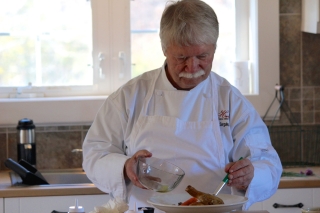
Guiding Principles to Incorporate Now
11 August 2025Commit to these guidelines and observe how your program changes the world one student at a time.
By Paul Sorgule, MS, AAC
Feedback & comments: This email address is being protected from spambots. You need JavaScript enabled to view it.
I know there are still a few days left to your summer break, but sooner than you might like, a new school year will begin. After a very exciting June Deans and Directors and Leadership Conference, I hope you are prepared to “Think Differently.” So, here are a few guiding principles as you step into another adventurous year:
Mass customization
Take a hard look at how you teach. Each student may learn differently. Pay attention and discover what works for individuals rather than teaching to the majority.
Commit to becoming a learning organization
Invest as much effort in creating learning opportunities for your faculty and staff as you do for students. Lift your team and they will do the same for your students. Conferences, workshops, webinars, subscriptions, blogs, podcasts, in-service training, guest speakers, faculty retreats – tap into all of it and help your organization find its groove.
Make communication a priority
A recent survey found that almost every organization stated that a lack of communication or confusing communication from leadership was their greatest concern. Plan short meetings with a focus, create newsletters, keep concise dashboards of key issues and metrics, make open book financials the norm, and hold one-on-one catchups. Don’t forget the simple means of bulletin boards and social gatherings as communication tools. It all helps.
Incorporate tech as a tool
Don’t ignore AI and online models, hoping they will go away. Don’t resist the latest piece of software or app that might make your work more efficient or effective. You can embrace it all as a tool and invest the time to learn.
Create an ideation environment
The next earth-shattering, brilliant idea for your program is bouncing around in the brain of someone who works in your organization, or it might even be clinging to one of your students. Build an organization where ideas are welcomed and NEVER discounted.
Ask why – often
Don’t get stuck in the dreaded prison that stops ideas from developing or coming to fruition. Tag each obstacle with plenty of “whys” and flush out the real reason people are against change.
Listen more
Become the Dean of Listening and pay serious attention to people’s ideas and concerns. Even if you don’t solve the underlying issues, the fact that you respect communication is a leap in the right direction.
Become central to your cCommunities
Become the program people can’t live without. Don’t ignore any of the communities that are part of your eco-system: the college administration, other departments within the college, your local residential community, restaurant and hotel operations, your regional farming community, food artisans, and certainly all the potential employers of your students.
Consider life-long learning
What can you offer to students who have graduated? What services and products might you offer area restaurateurs and chefs? How can you service the food community in general with educational products?
Competence and confidence through rigor and repetition
Invest less time in measuring test scores and more time measuring real competence and confidence. Competence includes a sense of urgency, multitasking and problem solving. Spend more and more time on critical skills, volume preparation, and adding the elements of timing and surprise.
Make excellence a habit
Even the smallest tasks should come from an appreciation of excellence. Items such as research projects, journals, cleanliness, ironing uniforms, workstation organization and washing pots and pans are all completed with excellence as the standard.
Expect more from faculty, students and yourself
Push everyone to rise to the occasion. If you expect very little then they will give you that – so, expect more, measure to a higher standard and most will do what needs to be done.
Have a great school year. Continue to make a difference in people’s lives. You can change the world – one student at a time.
PLAN BETTER – TRAIN HARDER
Paul Sorgule, MS, AAC, president of Harvest America Ventures, a mobile restaurant incubator based in Saranac Lake, N.Y., is the former vice president of New England Culinary Institute and a former dean at Paul Smith’s College. Contact him atThis email address is being protected from spambots. You need JavaScript enabled to view it..
